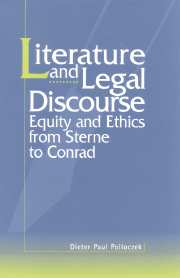Book contents
- Frontmatter
- Contents
- Preface
- Chapter 1 Introduction
- Chapter 2 Trappings of a transnational gaze: legal and sentimental confinement in Sterne's novels
- Chapter 3 Reinstitutionalizing the common law: Bentham on the security and flexibility of legal rules
- Chapter 4 Aporias of retribution and questions of responsibility: the legacy of incarceration in Dickens's Bleak House
- Chapter 5 A curse gone re-cursive: the case and cause of solidarity in Conrad's The Nigger of the “narcissus”
- Chapter 6 Conclusion
- Notes
- Index
Chapter 6 - Conclusion
Published online by Cambridge University Press: 22 September 2009
- Frontmatter
- Contents
- Preface
- Chapter 1 Introduction
- Chapter 2 Trappings of a transnational gaze: legal and sentimental confinement in Sterne's novels
- Chapter 3 Reinstitutionalizing the common law: Bentham on the security and flexibility of legal rules
- Chapter 4 Aporias of retribution and questions of responsibility: the legacy of incarceration in Dickens's Bleak House
- Chapter 5 A curse gone re-cursive: the case and cause of solidarity in Conrad's The Nigger of the “narcissus”
- Chapter 6 Conclusion
- Notes
- Index
Summary
It occurs to them all that there is more to any of them than any of them suspects. But sometimes we need coaxing to act on our own accord.[…] Tell me how free I am.
Richard Powers, Prisoner's DilemmaOn the literary sites of sentimentality, philanthropy, and solidarity, Sterne, Dickens, and Conrad play off on the diversity of functions that legal fictions can perform. All three share the assumption that the modern disjunction of equity and legal fiction - a disjunction that Shakespeare staged early on by interweaving the legal and tragic aspects of Ophelia's suicide - changed conventional expectations toward equitable justice. This change also includes literature's role in endorsing or questioning such expectations. Whatever the disadvantages of that disjunction for the project of Enlightenment, the authors build on the assumption that that change also opened up fictional spaces for modern literature to articulate marginal voices. For that reason, all three relocate the mechanism of legal fictions in literary contexts.
One result of that relocation is that they end up challenging a certain confidence, spread by many Enlightenment thinkers, that critical reason is a viable instrument with which to pursue equity. To the extent that the law had become more positive and thus more rapidly alterable, critical reason appeared to end up having to solve problems that it had itself created, for instance Hobbes's attempt, after the civil war, to depoliticize conscience.
- Type
- Chapter
- Information
- Literature and Legal DiscourseEquity and Ethics from Sterne to Conrad, pp. 243 - 245Publisher: Cambridge University PressPrint publication year: 1999



